Have you ever scrolled through the news and felt bombarded by all the negative headlines?
You know the kind:
- “Local Man Accused…”
- “Neighborhood Business Owner Indicted…”
- “Big Bust in Local Sting Operation…”
Yeah, it’s everywhere. And if you’re the person in those articles, it feels like you carry a huge weight.
Suddenly, it seems like everyone’s against you, and you’re stuck wondering if it’s time to pack up and change your name.
But hold on… don’t rush to disappear. This isn’t your entire story.
Here’s the thing: Bad news, especially the kind that’s inaccurate or old, can really mess with how people see you or your business online.
But don’t worry, there’s hope.
You can actually do quite a bit to make those annoying articles less visible or gone altogether.
Instead of frantically looking for a magic “delete” button on Google, let’s talk about smart ways to clean up your online presence.
Why Negative News Ranks So Highly
News sites often appear at the top of search results because they’re trusted by Google. They publish constantly, and their sites carry authority. That means even a minor story can outrank your personal website or business page.
How long a story stays online depends on the publisher. Some outlets keep everything forever. Others archive after a few years. Occasionally, if the article is outdated or inaccurate, you can ask the publisher to remove or update it. A polite, professional request goes a long way – but most publishers won’t take something down unless there’s a clear legal reason.
Content Removal Strategies
Negative news articles can harm your reputation and linger on the internet for years. Fortunately, there are several ways to remove or suppress unwanted content. The right approach depends on the source of the article and the policies of search engines like Google.
So, here are 7 smart ways to remove articles from search results.
Option 1: Contact the newspaper editor.
The fastest way to remove content is by reaching out to the publisher. Submit an unpublishing request if the article is outdated, inaccurate, or violates a website’s content removal policies. Some sites may remove or update content upon request.
You can use tools like DomainTools or Whois to find the web admin’s contact information.

Your Action Plan
If an article about you is causing problems, you need to take action. Start by finding the right person to contact. Look for the editor’s name or the person in charge of content on the publication’s “Contact Us” page. Once you have their details, write a polite and clear request explaining why the article should be removed. Be specific – mention any inaccuracies, outdated information, or privacy concerns. If you have proof, include it to strengthen your case.
Be sure to highlight how this article is affecting you or others who are involved. If it’s damaging your reputation, causing distress, or leading to unwanted attention, explain the impact. A well-reasoned and strong request increases your chances of success.
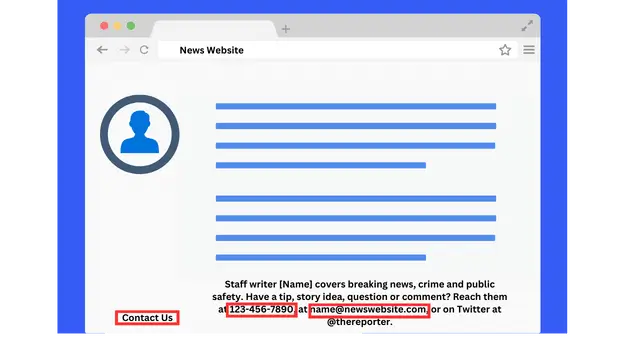
Example:
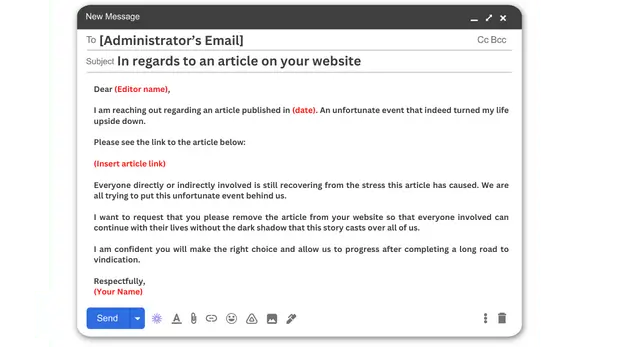
Before you reach out to the editor, having a plan in place is crucial. If the publisher doesn’t agree to take down the article, your next step should be to make it less visible in search results.
If you spot a mistake in the article, letting the publisher know might lead them to update it. An update in the content can make it more visible online, as the update can make it seem more relevant to search engines. Be sure to ask for the article to be removed.
Option 2: The Newspaper can apply Noindex Tags
Ask the newspaper to add a “no-index” tag on the page. It’s like making the article invisible to Google and other search engines without actually deleting it.
What’s a No-Index Tag?
Think of a “no-index” tag as a bit of code in the website’s background that tells search engines, “skip this page.” The article stays up, but it’s hidden from anyone using Google to search it.
Asking for a No-Index Tag
Reach out to the newspaper like you would if you were trying to get the article removed. But this time, you’re asking them to hide it from search engines instead. Point out how people searching for you are getting bad information.
Here is the code: Place the following meta tag into the <head> section of the page:
<meta name=”robots” content=”noindex”>
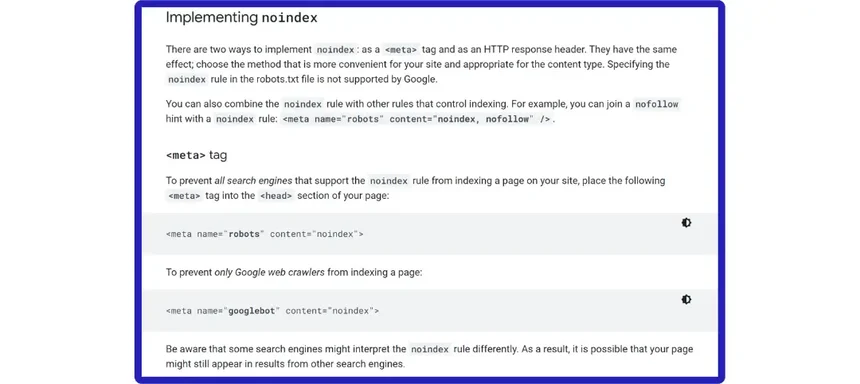
A no-index tag is a good alternative for removing the article.
It’s perfect for when website owners want to help you but aren’t ready to remove articles completely. This way, you both win: the content stays, but it’s not connected to your name.
Option 3: Use Google Deindexing
When the website owner refuses to remove the article and the editor won’t add a “no-index” tag, your next step is to ask Google to remove the article from their search results. If suppressing content isn’t enough, Google offers tools for content removal. The most commonly used tool is the DMCA form. This allows you to request the removal of copyrighted material. If the negative article uses your content without permission, this can be a straightforward solution.
Another option is Google’s “Remove Outdated Content” tool. It helps take down links that no longer exist but still appear in search results. This won’t remove an active article but can clean up outdated mentions.
The success of these tools depends on the situation. Google rarely removes factual content simply because it’s negative. However, if the content is harmful, defamatory, or breaches privacy, you can report it. Filing a complaint with Google is free, but results may take time and aren’t guaranteed.
How to Ask Google to Remove an Article:
- Why Google Might Agree: Google needs a good reason to take something off their search results. This could be because it’s violating their guidelines or you have a court order.
- Legal Removal Form: If the article breaks the law or shares private info, Google has a form where you can ask them to take it down.
- What You Need: Be ready to show proof that supports your request. This might include legal documents, screenshots, and previous communication with the website admin.
Asking Google to remove an article is a bit more formal and might need you to gather evidence. But if an article is causing trouble or stress, it’s an option worth considering.
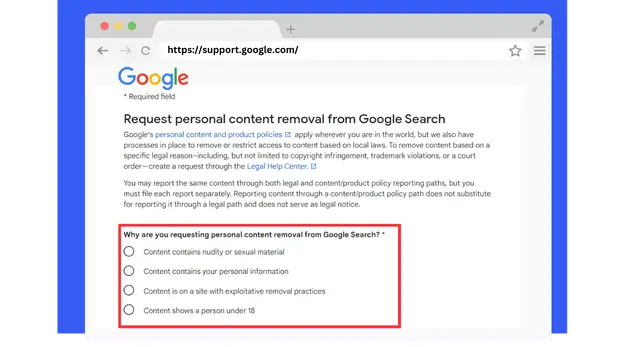
Google also removes content for specific legal reasons, such as DMCA copyright violation reports and child sexual abuse imagery.
Collect all the information that will help Google decide and file a report.
Option 4: Leverage the Right to Be Forgotten
If you live in places like the EU, Argentina, or other regions with strict privacy laws, you have a powerful option on your side. It’s called the Right to Be Forgotten. This law lets you ask search engines—Google, Bing, and others – to take down outdated or irrelevant information about you.
The idea is simple: people should have some control over their personal data. If an old news story, a misleading blog post, or an embarrassing record is hurting your reputation and it’s no longer relevant, you can request its removal.
This right, however, isn’t global. In the United States, for example, free speech laws outweigh privacy claims, so the same protections don’t apply.
If you want to make a request, here’s how it usually works:
- Gather your evidence. Show why the content should be taken down. Is it inaccurate? Outdated? No longer in the public interest?
- Explain the impact. Let the search engine know how the content harms you – whether it’s blocking job opportunities, damaging your reputation, or even affecting your mental health.
- Check the rules. Every country has slightly different standards for what qualifies, so make sure your case fits before you submit it.
Even then, there are no guarantees. Search engines weigh your request against the public’s right to know. If the content is considered historically important or tied to journalism, it may stay online.
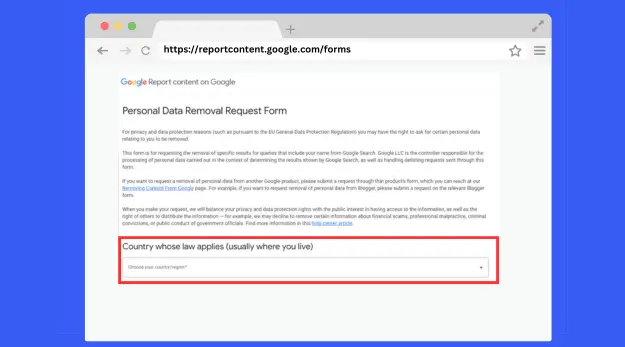
If you live in an area that accepts the Right to be Forgotten, you can file a report here.
Option 5: Legal and Professional Assistance.
You may have grounds for defamation if the negative article contains false information. Consulting with an attorney experienced in defamation cases is a good starting point. They can send cease-and-desist letters or escalate the matter to court if needed. This approach is especially effective against smaller sites that might not have the resources to fight a legal battle.
Why work with a content removal lawyer?
- Expertise: Lawyers know their way around the law, making dealing with stuff like slander or privacy issues easier.
- Cease and Desist Letters: A stern letter from your lawyer can make people sit up and take notice, even when they’ve ignored your previous pleas.
- Going to Court: If things get really serious, your lawyer can take it to the next level by starting legal action against the publisher.
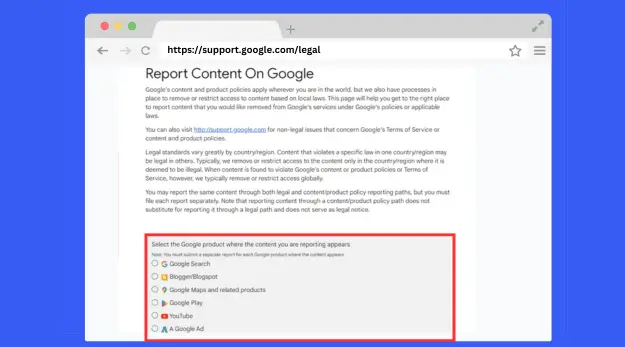
Things to consider: lawyers aren’t cheap, and there’s no promise you’ll win.
The road through the legal system can be long and winding, needing a lot of patience. Plus, court battles are expensive.
It’s all about weighing the cost against how much you want that content gone.
Suing for defamation isn’t always easy. You’ll need to prove the information is false, harmful, and published with intent to damage your reputation.
Removing the article entirely may still depend on the publisher even with a successful case. This is where professional assistance adds value.
Think about this route when you’ve tried everything else or when the issue has big legal consequences.
Option 6: Work with Online Reputation Management (ORM) Experts
Why not go beyond just content removal? Reputation management experts know the best channels to address content issues effectively.
A professional online reputation management firm can handle direct removal requests, search engine results cleanup, and long-term reputation repair. They use a mix of legal tactics, content creation, and SEO strategies to minimize negative visibility.
Imagine this scenario: You get rid of one negative article, but then another pops up elsewhere, putting you right back where you started. That’s where a reputation management company comes into play.
They don’t just do clean-up; they protect you from future negativity.

Don’t play “Whac-A-Mole” with your reputation.
Working with Professionals
Handling negative search results can be stressful and time-consuming. If you need help removing harmful content, working with online reputation management (ORM) companies or legal experts can make the process easier. A reputation management expert understands how to use content removal techniques and suppression methods to reduce the visibility of damaging information. These professionals monitor search results, manage your online presence, and take steps to protect your reputation.
A content removal lawyer can provide legal support for cases involving defamation or false information. They help navigate legal paperwork and may work with the attorney review board to address violations. Attorneys also ensure that takedown requests comply with website policies and laws. Meanwhile, content managers and reputation specialists monitor social media to prevent further harm. Whether you choose ORM professionals or legal assistance, having the right team improves your chances of removing unwanted content and restoring your online image.
Option 7: Content Suppression Strategies
Removing a negative article isn’t always possible. Instead, suppressing it with positive content can be effective. Google ranks content based on relevance and authority. You can use this to your advantage by optimizing the content you control.
Start with your website. Create fresh, engaging, and keyword-rich pages that highlight your strengths.
Update blogs regularly with valuable information that showcases your expertise.
Building a new website can also help. Focus on your name or brand as the domain. Fill it with professional achievements, services, or community involvement. The more credible content you have, the higher the chances of pushing negative results lower in search rankings.
You can also contribute to third-party websites. Writing guest articles for reputable sites boosts your online presence and links back to your website. These backlinks signal to Google that your owned content is trustworthy, helping it rank higher than the unwanted articles.
Suppression vs. Removal
When dealing with negative content online, you have two main options: removal or suppression. Both methods help protect your reputation, but they work in different ways.
Content removal is the process of completely deleting unwanted or harmful material from the internet. This method is highly effective but often difficult to achieve. Websites have strict content removal policies, and search engines operate at their own discretion. It may be eligible for removal if the content violates terms of service—such as exposing private or sensitive information. However, good ORM companies warn that removal isn’t always guaranteed. Even when successful, it can be costly and time-consuming.
Suppression is a more common strategy used by reputation management services. Instead of deleting negative content, suppression pushes it down in search results by promoting positive or neutral content. This approach is useful when removal isn’t possible or practical. By creating and optimizing favorable content, suppression helps control what people see first. However, it requires ongoing maintenance to be effective.
When choosing between these methods, cost considerations are important. Removal can be expensive and may not always work, while suppression is an ongoing effort that requires regular updates. If you’re unsure which approach is right for you, consulting a professional reputation management service can help you evaluate the best strategy for your needs.
Steps to Suppress Negative Articles
If you can’t remove a negative article, suppressing it is your best bet. The goal is to push it down in search results so fewer people see it. Here’s how you can start:
1. Optimize Your Existing Content
Review your website, blog, and social media profiles. Keep everything updated with relevant information. Use search engine optimization (SEO) techniques like adding keywords, meta descriptions, and quality backlinks. Search engines prioritize fresh, high-quality content, so improving what you already have can help push negative articles lower.
2. Create Positive Content
New content can outrank negative articles over time. Write blogs, news stories, and press releases that focus on your successes. Use keywords similar to those in the negative article so your content competes directly. For example, if an article ranks for “XYZ Business Reviews,” publish customer testimonials or success stories using the same phrase. Posting regularly helps keep your content relevant and visible.
3. Contribute to Third-Party Sites
Publishing on trusted websites builds credibility and boosts your search rankings. Submit guest posts, interviews, or expert articles to industry blogs, local news sites, and popular online magazines. When authoritative sites feature your content, search engines recognize it as valuable, making it more likely to rank above negative press.
4. Build Backlinks to Positive Content
Backlinks, or links from other sites to yours, help search engines see your content as trustworthy. Reach out to business partners, industry blogs, and satisfied customers to link to your website. Share your content on social media and email newsletters to increase visibility. Listing your business on directories also strengthens your online presence. The more backlinks you build, the higher your positive content will rank, pushing negative articles further down.
Suppressing negative articles takes time, but with a strong content strategy, you can take control of your online reputation.
The Challenges of Removing News Articles
Getting rid of bad news articles from Google isn’t as easy as hitting the delete button.
Why?
Let’s break it down:
1. The Power of Public Interest: News sites value their credibility. So does Google. This trust puts more emphasis on how their stories rank in search results.
2. The Persistence of Search Engines: Articles can be copied, shared, or reposted on other websites, making removal challenging.
3. Archived Content: Many websites and online archives store copies of web pages, making it nearly impossible to erase an article completely from the internet.
Legal obstacles add another layer of complexity. Some websites are protected by free speech laws or claim they have no obligation to remove negative content. Without legal backing, content managers and content coordinators must rely on diligence and strategic efforts to suppress unwanted material. Removal might be tricky, but there are clever ways around it, like pushing it down in search results.
Legal Considerations for Content Removal
Removing harmful content from the internet isn’t always straightforward. While some websites honor a content removal request, others may refuse without legal pressure. If false or damaging information appears online, legal action may be an option. Defamation, which includes libel (written falsehoods) and slander (spoken falsehoods), is one of the most common grounds for lawsuits. To prove defamation, the content must be false, harmful, and not protected under free speech laws.
If the content is on a news site, news article accuracy may be challenged, but success depends on proving the information is incorrect or misleading. Some individuals seek expungement orders to remove legally outdated or sealed records, but this doesn’t always guarantee online removal. A court order for removal may be necessary if a website refuses to take content down voluntarily.
Another option is a Digital Millennium Copyright Act (DMCA) notice, which can be used to remove content that violates copyright laws. This is useful if your original content was posted without permission. For private matters, confidentiality motions or settlement agreements can sometimes be used to remove sensitive information.
In cases where full removal isn’t possible, deindexing can limit visibility on search engines, making it harder for people to find harmful content. However, legal challenges can be time-consuming and expensive, so it’s essential to weigh the costs and benefits before pursuing legal action.
Will the news article go away on its own?
Have you ever heard of the news cycle?
It’s how, after one news piece goes live, the next one doesn’t pop up until about a day later.
That’s the news cycle – a whole day passing between daily updates.
While it started with newspapers, this concept now covers all ways we get news.
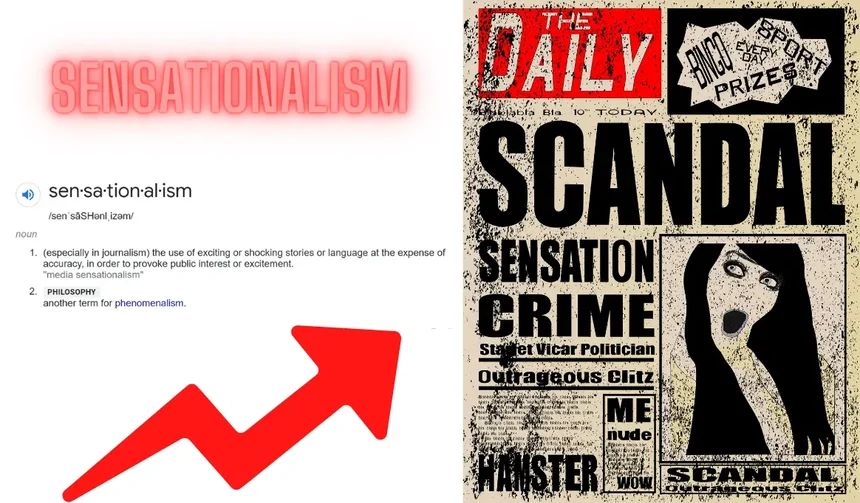
Once the next news cycle is published, any negative news about my name should be removed, right?
The short answer is no.
According to Google Trends, the average “big story” lasts about seven days before the public moves on to the following shocking headline.
Let’s face it, most of us don’t make headlines daily. So, the top thing popping up on Google with your name? It’s going to stick around until something fresher comes along.
Now, while old newspapers end up in the recycle bin, online articles? They live on. Getting rid of them isn’t as simple as throwing them out with the recycling.
Understanding the Journalistic Landscape
Factual News (Tricky): These articles are all about the facts. If you find one that’s sharing false or misleading info, you should argue for its removal. But, they could just update it.
Opinions or Commentary (Also Tricky): Unless it crosses the line into hate speech or defamation, it’s probably staying put. Freedom of speech is a big deal.
Personal Stories or Interviews (Somewhat Tricky): Wanting something deleted just because you don’t like it? That’s tough. But if it’s sharing your private info without permission, you’ve got a better chance.
Investigative Reports (Very Tricky): These pieces require a lot of work and often shed light on big issues. Given their impact and the effort behind them, getting them erased is a tall order.
Public Records (Easier): Articles based on public records, like court docs, can sometimes share too much about you, violating privacy laws. But if it’s about something that did happen, like an arrest, it gets a bit more complicated.
If you are found “not guilty,” will the newspaper remove your article?
Many newspapers aren’t aware that their stories can have a negative impact on your life. Even if they were, most wouldn’t bother to care.
But, if a story changes because someone is proven innocent or there’s new information, the good publishers will often update or delete that story. They don’t have to do this by law, but it’s the right thing to do.
If a story has a big mistake, it might be completely pulled from a website. This is known as a retraction. For smaller mistakes, a correction, or “corrigendum,” is made.
Monitoring and Managing Online Reputation
Prevention is better than cure. Regularly monitoring your online presence is crucial. Set up Google Alerts for your name or brand to receive notifications about new mentions. This helps you catch negative content early and address it before it escalates.
Building a strong online reputation involves consistent effort. Create profiles on social platforms like LinkedIn, Twitter, or Instagram, and keep them active. These profiles rank well on Google and can push negative articles further down.
Publishing positive content is a great strategy. Celebrate milestones, share customer testimonials, or showcase community involvement. Positive stories build trust and dilute the impact of any negative content.
Key Takeaways
Getting rid of a news article online isn’t quick or easy. Instead, focus on pushing down the bad news to get it off Google’s first page.
You can try fixing this on your own or get experts to help. Either way, the aim is to make sure your online image is impressive.
If you have found a negative news article has been published about you, contact us today for a FREE consultation. We will provide a detailed strategy to repair your online reputation quickly.

